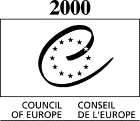Ending
domestic violence:
action
and measures
|
 |
Proceedings
of the Forum
Bucharest (Romania), 26-28 November 1998
Steering
Committee for Equality
between women and men
|
THE COUNCIL OF EUROPE
Founded in 1949, the Council of
Europe is an international organisation with a European vocation, which at
present has 41 European member States, all of which are pluralist
parliamentary democracies
(this figure includes the 15 member States of the European Union). It is
the European continent’s largest intergovernmental and parliamentary
forum. Its seat is in Strasbourg (France).
The objectives of the Council
of Europe are:
-
to work for the closer union of the more than
800 millions women and men of Europe;
-
to safeguard and develop democracy and human
rights;
-
to undertake co-operation in the broadest
sense between the member States in the fields of human rights (including
the media, the field of national minorities, and that of combating racism
and intolerance), education, culture, social questions, health, youth,
local and regional authorities, environment and legal affairs.
The consideration of equality
between women and men, seen as a fundamental human rights, is the
responsibility of the Steering Committee for Equality between Women and
Men (CDEG). The experts who form the committee are entrusted with the task
of stimulating action at the national level, as well as within the Council
of Europe, to achieve effective equality between women and men. To this
end, the CDEG carries out analyses, studies and evaluations, defines
strategies and political measures, and where necessary, frames the
appropriate legal instruments.
|
CONTENTS
Page
INTRODUCTORY
NOTE ..........................................................................................
7
PROGRAMME.............................................................................................................9
OPENING
ADDRESS by Mr Pierre-Henri IMBERT,
Director
of Human Rights, Council of Europe........................................................13
KEYNOTE
SPEECH by Ms Carol HAGEMANN-WHITE (Germany).................
17
I.
THEME:
ENDING DOMESTIC VIOLENCE: ACTION AND MEASURES
Sub-theme
1.
Confronting domestic violence and
its consequences
Rapporteur: Ms Maryse JASPARD (France)...........................................
27
Sub-theme
2.
Assistance and support for victims
Rapporteur: Ms Astrid KECKEIS
(Austria)..............................................
39
Sub-theme
3.
Working with perpetrators
Rapporteur:
Mr Per ISDAL (Norway)........................................................
47
Sub-theme
4.
Prevention of domestic violence
Rapporteur: Ms Urszula NOWAKOWSKA
(Poland)............................. 51
II.
REPORTS
OF THE WORKING GROUPS
Working Group on Sub-theme 1.............................................................69
Working Group on Sub-theme 2.............................................................73
Working Group on Sub-theme 3.............................................................77
Working Group on Sub-theme 4.............................................................79
III.
CONCLUSIONS
BY THE GENERAL RAPPORTEUR
Ms Gabriela ADAMEŞTEANU (Romania).................................................83
ADDRESS
by Ms Norica NICOLAI (Romania)
State
Secretary, Ministry of Labour and Social Protection.........................................93
CLOSING
ADDRESS by Mr Hanno HARTIG
Head
of Division II, Directorate of Human Rights, Council of Europe......................95
IV.
APPENDICES
1.
List of participants........................................................................................
97
2.
Reference documents and background documents
submitted to the participants 109
|
|
![]() http://www.eurowrc.org/
Institutions
http://www.eurowrc.org/
Institutions ![]() COE - Bucarest (Romania), 26-28 November
1998
COE - Bucarest (Romania), 26-28 November
1998